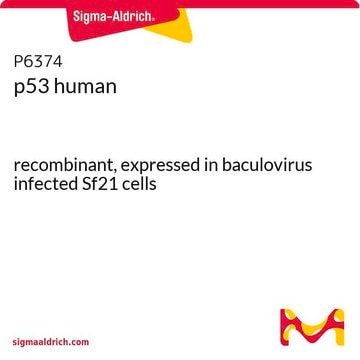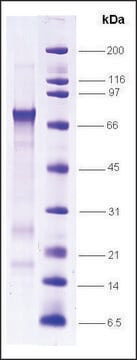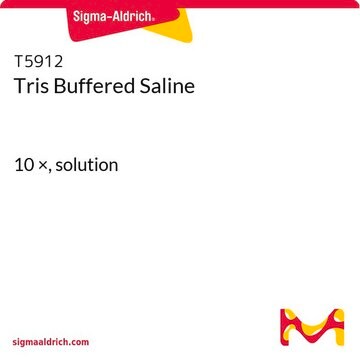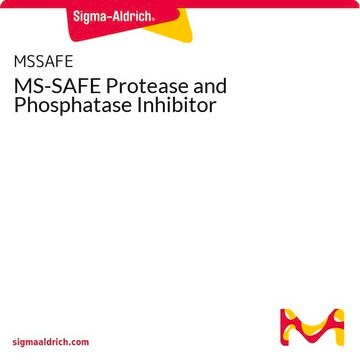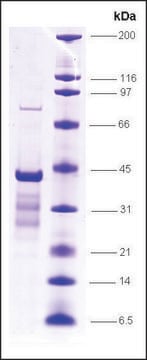P6249
p53 human
recombinant, expressed in E. coli, buffered aqueous glycerol solution
Přihlásitk zobrazení cen stanovených pro organizaci a smluvních cen
About This Item
UNSPSC Code:
12352202
NACRES:
NA.25
Doporučené produkty
biological source
human
Quality Level
recombinant
expressed in E. coli
assay
≥90% (SDS-PAGE)
form
buffered aqueous glycerol solution
UniProt accession no.
application(s)
genomic analysis
shipped in
wet ice
storage temp.
−20°C
Gene Information
human ... TP53(7157)
Hledáte podobné produkty? Navštivte Průvodce porovnáváním produktů
General description
p53 is regulated by MDM2, which acts as a negative regulator of p53 transcription by promoting its degradation by functioning as an E3 ubiquitin ligase which recognizes the N′ terminal transactivation domain.
Application
Useful for the study of postranslational modification of p53, or protein-protein interaction studies.
Biochem/physiol Actions
p53 gene is highly conserved and expressed in normal tissues. It is the most commonly mutated gene in human cancer and more then 500 gene mutations have been described in various types of malignancies, hematologic as well as solid tumors. Intact p53 function is essential for the maintenance of the non-tumorogenic phenotype of cells. Thus, p53 plays a vital role in suppressing the development of cancer.
Physical properties
GST-tagged, full-length human p53
Storage Class
10 - Combustible liquids
wgk_germany
WGK 1
flash_point_f
Not applicable
flash_point_c
Not applicable
Osvědčení o analýze (COA)
Vyhledejte osvědčení Osvědčení o analýze (COA) zadáním čísla šarže/dávky těchto produktů. Čísla šarže a dávky lze nalézt na štítku produktu za slovy „Lot“ nebo „Batch“.
Již tento produkt vlastníte?
Dokumenty související s produkty, které jste v minulosti zakoupili, byly za účelem usnadnění shromážděny ve vaší Knihovně dokumentů.
Zákazníci si také prohlíželi
Dania Alarcon-Vargas et al.
Carcinogenesis, 23(4), 541-547 (2002-04-19)
The p53-Mdm2 paradigm represents the best-studied relationship between a tumor suppressor gene which functions as a transcription factor and an oncogene, which functions primarily as an E3 protein ligase. The intimate relationship between these two partners has expanded to include
Alejandra Ward et al.
BMC cancer, 11, 71-71 (2011-02-18)
Hepatocellular carcinoma (HCC), one of the most common cancers world-wide occurs twice as often in men compared to women. Predisposing conditions such as alcoholism, chronic viral hepatitis, aflatoxin B1 ingestion, and cirrhosis all contribute to the development of HCC. We
Se Kyung Lee et al.
PloS one, 10(8), e0124658-e0124658 (2015-08-05)
Overexpression of p53 is the most frequent genetic alteration in breast cancer. Recently, many studies have shown that the expression of mutant p53 differs for each subtype of breast cancer and is associated with different prognoses. In this study, we
BAP1 immunohistochemistry and p16 FISH to separate benign from malignant mesothelial proliferations.
Brandon S Sheffield et al.
The American journal of surgical pathology, 39(7), 977-982 (2015-01-31)
A variety of immunohistochemical (IHC) stains have been proposed to mark either benign or malignant mesothelial proliferations. Loss of the p16 tumor suppressor (CDKN2A), through homozygous deletions of 9p21, is a good marker of mesotheliomas but lacks sensitivity. Recent reports
Cristina Muñoz-San Martín et al.
Analytical and bioanalytical chemistry, 412(24), 6177-6188 (2020-01-29)
Proteases are involved in cancer' taking part in immune (dis)regulation, malignant progression and tumour growth. Recently, it has been found that expression levels of one of the members of the serine protease family, trypsin, is upregulated in human cancer cells
Náš tým vědeckých pracovníků má zkušenosti ve všech oblastech výzkumu, včetně přírodních věd, materiálových věd, chemické syntézy, chromatografie, analytiky a mnoha dalších..
Obraťte se na technický servis.